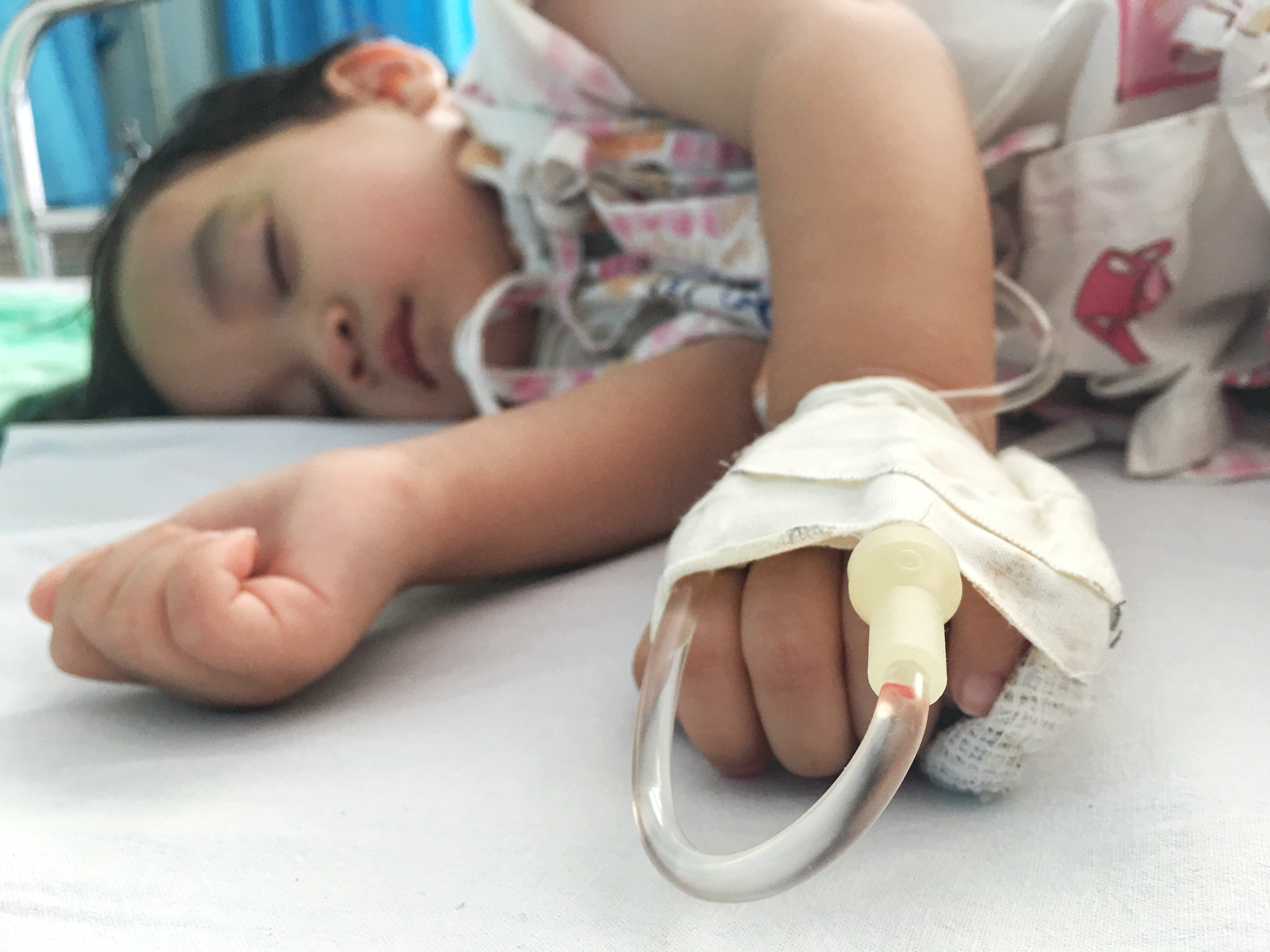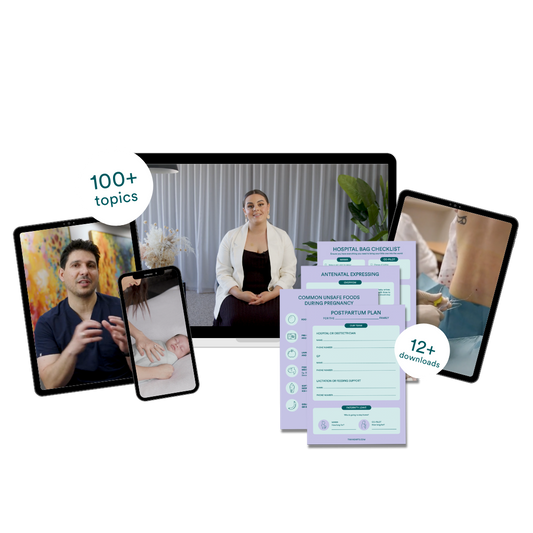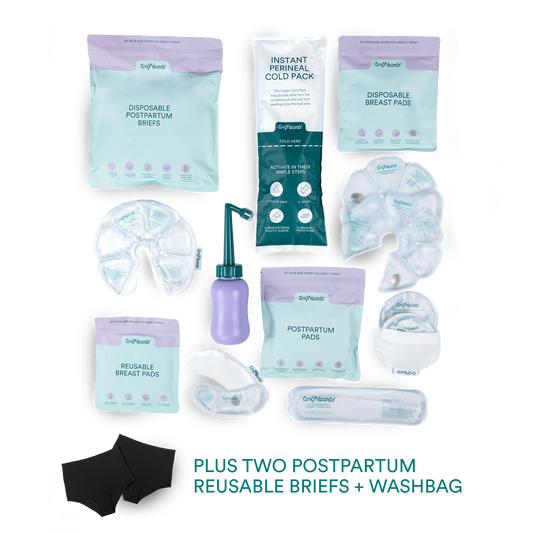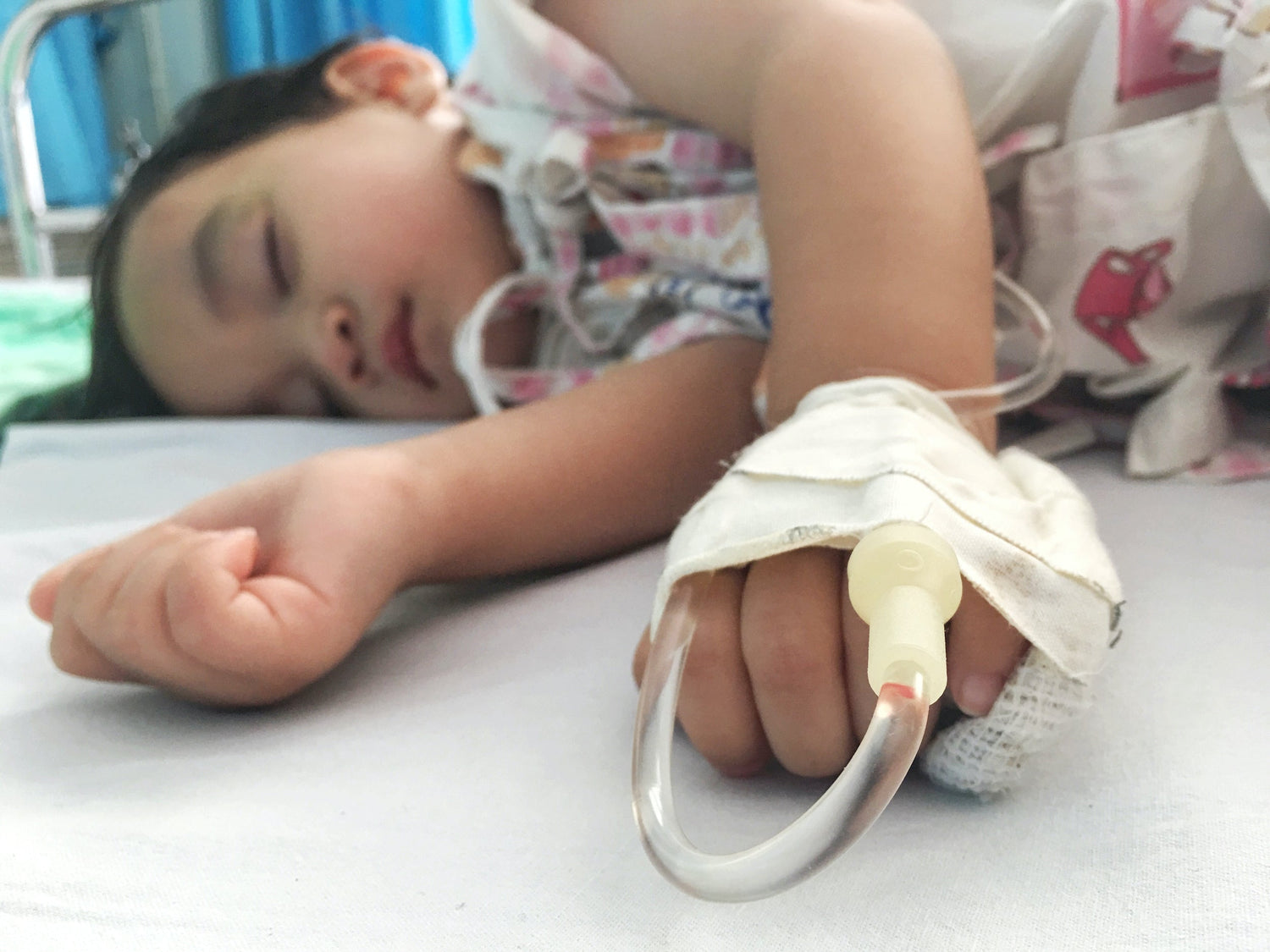dehydration
Dehydration happens so easily in little ones, particularly when unwell. In fact, they're at increased risk of becoming dehydrated compared to adults, and it can have serious consequences for them. It's so important to act quickly if you think your little one is dehydrated, so read on to learn all about it.
what is dehydration?
The body needs a certain amount of fluid to continue doing many things, such as maintaining body temperature and making bodily fluids like saliva + tears. When the body doesn't have enough fluid circulating around to function normally, this is considered 'dehydration'.
causes of dehydration
Dehydration occurs when not enough fluid is going in or too much fluid is going out. Situations where little ones can get dehydrated include:
- Your little one is refusing to breast or bottle-feed, particularly when unwell or your older kiddo isn't drinking enough
- Your little one is exercising or running around a lot, particularly in hot weather
- Excessive sweating Illnesses that cause a sore throat or mouth sores, like Hand, Foot + Mouth which make it painful to swallow
- Vomiting + diarrhoea, such as when they've got Gastro
- If they're taking certain medications like diuretics [which is a medication that makes your body create increased urine to flush out excess water]
If your little one has a fever, is out in hot weather or is aged under 6 months, they're also at increased risk of developing dehydration.

signs + symptoms of dehydration
Mild- moderate dehydration
- Dry lips, tongue, mouth + throat
- Nausea
- Headaches
- Dizziness
- Darker or smellier nappies/ wee
- Decreased wet nappies/ going to the toilet less frequently
Severe dehydration
- Lethargic + drowsy
- Irritable
- Extremely thirsty
- No tears when crying
- Coated tongue
- Fast breathing
- Pale in colour
- Sunken fontanelle + eyes
- Confusion
- Fast heart rate
- Cold to touch [in particular hands + feet]
Keeping Track of Dehydration

When kids are sick, they are at higher risk of dehydration. But with so many other things going on with a sick child at home, often tracking their hydration and output (wet nappies) gets missed. Using a tracker is a helpful way to monitor how much fluid is going into your child's body versus what is coming out. The amount of fluids going in and coming out is the kind of information health care professionals will want to know if you need to bring your child in for dehydration concerns
treatment for dehydration
Little ones
The best way to treat mild dehydration is to provide more fluids for your little one to drink. If your little one is under 6 months, increase the amount of breast or formula feeds [if possible] by offering the breast or bottle as often as you can, and always get them seen by a doctor.
If bub is over 6 months and you're breastfeeding, continue to do so but offer the breast more often. You can also offer oral rehydration solution or cooled, boiled water for the first 12 hours. If bub is formula-fed, replace their formula bottles with oral rehydration solution or cooled boiled water for the first 12 hours, then return to giving normal formula bottles more frequently.
The Royal Children's Hospital recommends water + oral rehydration solutions like Hydralyte + Gastrolyte, because these not only replace fluids but also body salts. You can buy them from lots of shops, like the chemist or Coles + Woolies. They come in many different flavours and as a powder, liquid or icy pole, which gives your little one lots of choice as to what they'd like [icy poles are always a hit in our house!] If your kiddo is refusing these, you can always give diluted apple juice [one part juice to four parts water] or their regular milk.
If bub is vomiting, the best way to give fluids is in small amounts, more frequently.
Older kiddos
For little ones who are older + over 10kg, give 1 cup of water or oral rehydration solution every hour for 4 hours [plus extra if vomiting or have diarrhoea]. It's important to avoid giving liquids that are high in sugar like lemonade + sports drinks because it can actually make it worse.
For older kiddos or bubs who have started on solids, offer foods that are high in fluids like watermelon, jelly, yoghurt, soup and custard. Don't be surprised if your little one doesn't feel like eating as much or even at all while unwell. Instead, focus on their fluid intake + hydration levels and allow them to eat as they choose.
If bub is really unwell with dehydration, they may be admitted to hospital. In the hospital, bub's medical team may recommend various treatments to help support them to get better or rehydrate them. These may include anti-nausea + vomiting medication [called an antiemetic], a feeding tube that goes through the nose into the stomach to allow milk to pass through + down the tube, or an IV drip where fluid to give fluid. While in hospital, they may also weigh bub each day, as well as weigh their wet nappies to work out how much is going in compared to how much is coming out. That's why it's important to let the nurses know if bub has a vomit, diarrhoea, is sweating etc., and to pass on their nappies to be weighed before being thrown out. It's also important to let them know if bub has a breast/ formula feed or eats/ drinks something else. This will all get recorded in something called a 'fluid balance chart' to monitor bub's input vs output.

wet nappies
Wet nappies can be a great indicator of your bub's hydration status. That's why whenever you take your little one to a doc, one of the first things they ask you about is wet nappies. They'll ask how many wet nappies your bub is having in 24 hours, how wet the nappies are [e.g. soaked/ damp], the colour of urine and if there's a smell.
What's normal?
On the first day of life, your bub should have one wet nappy. On day two; two wet nappies. Day three; three. Day four; four. From day five onwards, your little love should have at least five very wet disposable nappies or six very wet cloth nappies in 24 hours. Nappies should be odourless and clear/pale in colour.
What's not normal?
- Strong smelling urine
- Dark coloured urine
- Fresh blood in the nappy
- Urates in the nappy on or after day 4 [which look like rust marks]
- Fewer nappies than the amount stated above
- Other signs of dehydration or illness like lethargy, sunken fontanelle or confusion
the pinch test
Another tool we use to check for dehydration in little ones is The Pinch Test. When our bodies are well hydrated, our skin will "bounce back to normal". You can test this on your bub by gently pinching the skin on the back of their wrist. If the skin is slow to spring back or indents, your bub may be dehydrated.
When should i take bub to see a doctor?
If you think your little one, who is aged under 6 months or has a long-term illness, is dehydrated, they need to see a doctor. If your little one is showing signs of severe dehydration, is not responding to your attempts to rehydrate them or you're concerned, see a doctor or head up to ED. A good point to remember: If your little one is very thirsty, it's likely that they're already dehydrated. At the end of the day, you as parents know your little one best. And if you're concerned, it's time to listen to that parental instinct and get your little one seen by a doctor. In the original post, I'd love to know about a time your little one was dehydrated and how you managed it. Tag your loved ones while you're there. 💦
Helping you feel prepared for parenthood is what Tiny Hearts is all about. Book into our baby + child first aid class, and let us empower you to face parenthood without fear. 💗
online baby & child first aid
$145
Learn baby & child first aid from your device at home! Purchase now and learn right away.
Our instant access course includes over 38 videos and 15 bonus downloads including content on whooping cough, croup and more!









